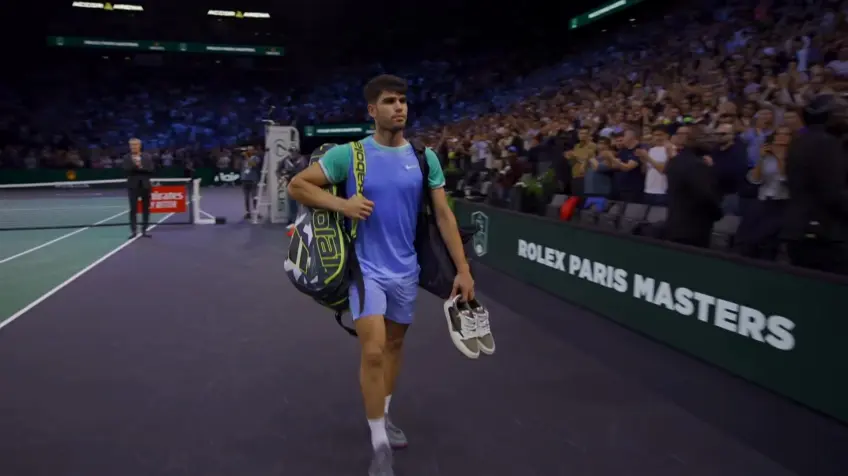Carlos Alcaraz Points Finger at Playing Surface, Expresses Frustration After Challenging Match
Madrid, Spain – In a candid moment following a challenging match, Carlos Alcaraz, the young tennis sensation from Spain, expressed his frustration with the playing surface, voicing his lack of understanding and adaptability to the conditions. Alcaraz’s comments came after he faced difficulties in maintaining his typically aggressive playstyle, which has earned him acclaim on the ATP Tour.

At just 21, Alcaraz has already established himself as one of the sport’s brightest stars. Known for his agility, power, and high-speed rallies, he has managed to dominate opponents on both hard courts and clay. However, the latest indoor hard-court tournament appears to have posed unique challenges for the young athlete. In his post-match interview, Alcaraz did not hold back, stating, “I do not understand this surface,” a remark that has drawn attention from both fans and analysts alike.
While Alcaraz has displayed comfort on outdoor courts, the shift to indoor hard courts has proven a tricky adjustment for him. Unlike outdoor courts, where conditions can vary due to weather and humidity, indoor courts provide a more controlled environment, with minimal external factors influencing play. However, the speed, texture, and bounce characteristics can vary significantly depending on the venue, sometimes causing even seasoned players to struggle.
Alcaraz’s challenge with the surface might stem from several factors. Indoor courts tend to be faster due to the lack of weather impact and lower friction on certain court types. For a player like Alcaraz, who thrives on long, physically intense rallies, the faster pace might reduce his ability to wear down his opponents, favoring instead those who rely on quick, aggressive points. These challenges have previously troubled some of the best players in the sport and are well-documented, as each surface type offers unique advantages and drawbacks.
Carlos Alcaraz’s rise has been meteoric. Since bursting onto the professional scene, he has broken records, won numerous titles, and proven himself against top-ranked players. His playstyle, often compared to a blend of Rafael Nadal’s tenacity and Novak Djokovic’s defensive skills, has made him a fan favorite and a feared opponent. His journey has seen him conquer both clay and outdoor hard courts, yet he acknowledges that adapting to each surface takes time and experience.
“Each surface has its own language,” Alcaraz explained in a previous interview. “You learn to read it over time, and it can take years to feel completely comfortable, even for players who have been on the tour for a while.”
Alcaraz’s remarks have sparked debate among analysts and fans about whether young players are being pressured to perform across all surfaces without sufficient adaptation time. While his frustration was palpable, Alcaraz also hinted at his commitment to improvement. “It’s part of the journey,” he added. “I know I need to work on this aspect, and it’s not something that can change overnight.”
This isn’t the first time that players have aired frustrations with specific surfaces. Roger Federer, Rafael Nadal, and Novak Djokovic have all voiced concerns over surface conditions at various points in their careers, with each citing that certain surfaces offer advantages to certain playstyles. Federer’s dominance on grass, Nadal’s expertise on clay, and Djokovic’s success on hard courts illustrate how different surfaces can impact performance.
Following Alcaraz’s comments, fellow players and fans took to social media to show their support. Many praised his openness and honesty, noting that adapting to different surfaces is a complex challenge faced by all athletes on the tour. Some fans even suggested that the ATP should consider the demands placed on young players to perform on multiple surfaces throughout the year, potentially causing fatigue and frustration as they attempt to navigate unfamiliar conditions.
Former world number one Rafael Nadal, who has mentored Alcaraz and seen his rise firsthand, chimed in with words of encouragement. “Carlos is a remarkable talent,” Nadal stated in an interview. “He will figure this out, just as we all had to adapt. It’s part of learning and growth.”
Alcaraz’s comments reflect his desire for perfection and highlight the pressures young stars face to meet high expectations. His honesty shines a light on the unique difficulties of playing in varied conditions, which require not only skill but also mental resilience and time for adjustment. Moving forward, Alcaraz plans to continue working on his game and refining his techniques to suit all surfaces, a goal that he believes will ultimately strengthen his overall performance.
In the end, Alcaraz’s statement underscores the broader debate in the world of tennis: while certain players have found ways to dominate across all surfaces, the journey to achieving that level of adaptability is no easy feat. For Carlos Alcaraz, it’s another step in his promising career as he seeks to solidify his place among the all-time greats, no matter the surface under his feet.
Leave a Reply